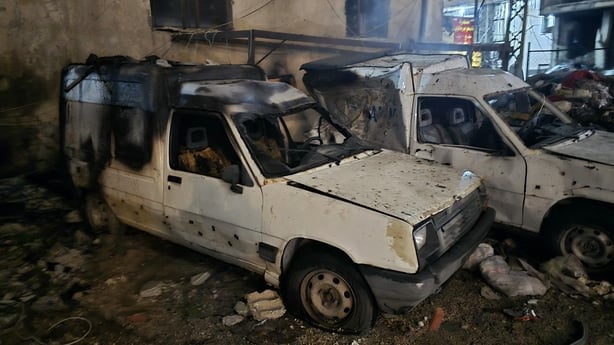An Israeli drone targeted a car in a southern Lebanese town, state media reported, a day after the most intense escalation since a November ceasefire.
"An Israeli drone carried out an airstrike this morning, launching a guided missile targeting a car in the town of Aita al-Shaab" near the border with Israel, Lebanon's official National News Agency said, reporting an unspecified number of casualties.
Israel launched the new wave of strikes on Lebanon in response to a rocket attack from across the border, as militant group Hezbollah denied responsibility for the launch.
Lebanon's official National News Agency reported one girl among five people killed in an Israeli strike on the southern town of Touline yesterday.
The agency later said three people were killed in an Israeli strike on the city of Tyre, targeted in the second wave of strikes on the south and east, with multiple injuries also reported.
A spokesman for the Tyre Disaster Management Uni, said two people were killed and two wounded when "an Israeli strike targeted an apartment in a residential building in the Al-Raml neighbourhood of Tyre", a key coastal city targeted for the first time since the ceasefire.
A security source told journalists that a Hezbollah official was targeted in the Tyre strike, without confirming whether he had been killed.
Israel's military said six rockets, three of which were intercepted, were fired from Lebanon into northern Israel, setting off air raid sirens.
Hezbollah denied any involvement in the rocket attack, and called Israel's accusations "pretexts for its continued attacks on Lebanon".
While Hezbollah has long held sway over parts of Lebanon bordering Israel, other Lebanese and Palestinian groups have also carried out cross-border attacks.
Lebanese Prime Minister Nawaf Salam warned that renewed military operations on the southern border risked "dragging the country into a new war", his office said.
Foreign Minister Youssef Raggi called for "pressure on Israel to stop the aggression and escalation and contain the dangerous situation on the southern borders".
Israeli defence chiefs said they hold the Lebanese government responsible for all hostile fire from its territory, regardless of who launches it.
"We cannot allow fire from Lebanon on Galilee communities," Mr Katz said of towns and villages in the north, many of which were evacuated after Hezbollah began firing at Israel in support of Hamas in October 2023.
"The Lebanese government is responsible for attacks from its territory."
UN 'alarmed'
The United Nations peacekeeping force in southern Lebanon said it was "alarmed by the possible escalation of violence" following yesterday morning's rocket fire.
France, which helped broker the ceasefire, condemned the rocket fire and urged Israel to show "restraint", while Jordan called for immediate international action to "stop the Israeli aggression against Lebanon".
Hezbollah has long had strongholds in south and east Lebanon, as well as south Beirut, but the war with Israel dealt the group devastating blows, leaving it massively weakened.

Under the ceasefire, Hezbollah is supposed to pull its forces north of the Litani River, about 30km from the Israeli border, and dismantle any remaining military infrastructure in the south.
Israel is supposed to withdraw its forces across the UN-demarcated Blue Line, the de facto border, but has missed two deadlines to do so and continues to hold five positions it deems "strategic".
Israel has carried out repeated air strikes during the ceasefire, targeting what it said were Hezbollah military sites that violated the agreement.
The Lebanese army said it had dismantled three makeshift rocket batteries in an area north of the Litani.
The Department of Defence confirmed yesterday that Irish peacekeepers in Lebanon are safe.
In a statement, Tánaiste and Minister for Defence Simon Harris said he is "deeply concerned about the latest escalation in violence and tensions between Israel and Lebanon".
The Tánaiste insisted "it is absolutely vital now that all sides show restraint".

